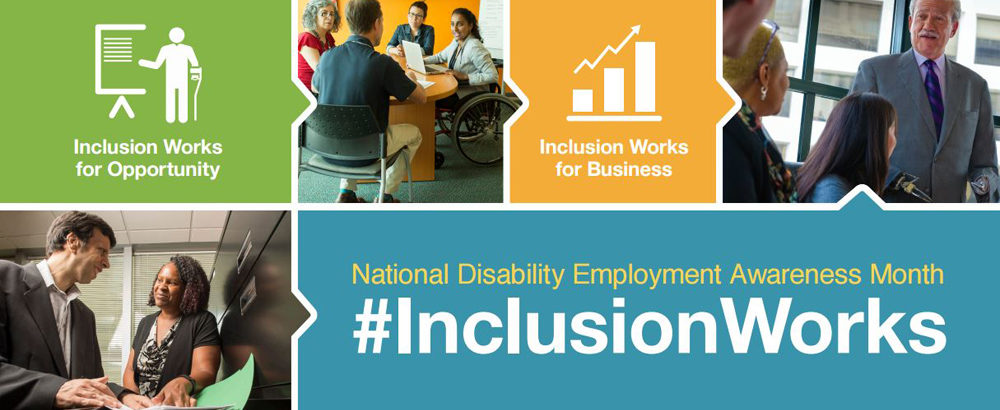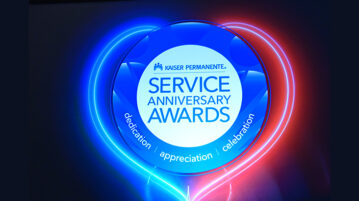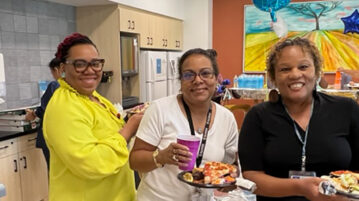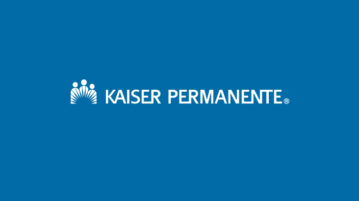October is National Disability Employment Awareness Month, an event that celebrates the many and varied contributions made by individuals with disabilities every day.
Marc Wilkerson, disability case manager, Integrated Disability Management in the Kaiser Permanente Mid-Atlantic States Region, has a running joke about his blindness with the guys he grew up with. “We always knew you could see,” they joke. That’s because Marc, who lost his vision as an infant, never let his disability hold him back — from riding his bike around the neighborhood, to graduating from Georgetown University and then receiving a law degree from the Howard University School of Law. Nor did it hold him back in jobs where he had the privilege to advocate for legislative changes that had positive outcomes for the disability community.
October is National Disability Employment Awareness Month, an event that celebrates the many and varied contributions made by individuals with disabilities every day. But the month also sheds light on the unemployment, or underemployment, of so many individuals with disabilities across the United States. Individuals with disabilities are our neighbors, co-workers, friends and family members.
In support of NDEAM, we are sharing the stories of three Kaiser Permanente employees with disabilities — Marc Wilkerson, Michael Siver and Oscar Reyes — to highlight the challenges they overcame and the successes they experienced before joining Kaiser Permanente.
Overcoming conscious and unconscious bias
Wilkerson, Siver and Reyes have each experienced employment discrimination at different points in their lives because of their disabilities. Awareness of individual bias — whether conscious or unconscious — and discrimination is key to challenging stigmas and debunking the myths and misconceptions about working with individuals with disabilities. National Disability Employment Awareness Month is a great time to consider how organizations like Kaiser Permanente can create an even more inclusive and supportive culture for all individuals regardless of ability. Learn how #InclusionWorks at Kaiser Permanente.
Independence is the key to success
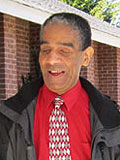 Wilkerson, who lost his vision as an infant to retinoblastoma, had a normal childhood; his parents never held him back from doing things because of his disability. “I had a sense of adventure, especially in my younger years. I attended summer camps for the blind and visually impaired and learned to hike, canoe, rock climb, play beep baseball (an adaptation for the blind and visually impaired), and more. I also hung out with my three brothers, none of whom had a disability, and the kids in my neighborhood. I went swimming, rough-housed with the guys, just all the stuff other kids were doing.”
Wilkerson, who lost his vision as an infant to retinoblastoma, had a normal childhood; his parents never held him back from doing things because of his disability. “I had a sense of adventure, especially in my younger years. I attended summer camps for the blind and visually impaired and learned to hike, canoe, rock climb, play beep baseball (an adaptation for the blind and visually impaired), and more. I also hung out with my three brothers, none of whom had a disability, and the kids in my neighborhood. I went swimming, rough-housed with the guys, just all the stuff other kids were doing.”
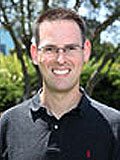 Siver, who was born with cerebral palsy and has what’s called right-hemi paralysis, didn’t remember his disability being an issue until he was 9 or 10. “I tried a lot of things growing up like playing instruments, participating in sports, and riding a bike, but even though most of these things didn’t work for me, I don’t remember ever feeling like a failure. My parents were very supportive and never discouraged me from trying something. As long as they felt I could be safe doing it, they gave me the freedom to try. And these experiences helped me figure out what did work for me — what I’m good at — like making people laugh, public speaking, being a good friend, and now I’m learning how to be a good father.”
Siver, who was born with cerebral palsy and has what’s called right-hemi paralysis, didn’t remember his disability being an issue until he was 9 or 10. “I tried a lot of things growing up like playing instruments, participating in sports, and riding a bike, but even though most of these things didn’t work for me, I don’t remember ever feeling like a failure. My parents were very supportive and never discouraged me from trying something. As long as they felt I could be safe doing it, they gave me the freedom to try. And these experiences helped me figure out what did work for me — what I’m good at — like making people laugh, public speaking, being a good friend, and now I’m learning how to be a good father.”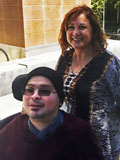 Reyes, who was born with spinal muscular atrophy, credits his older sister for pushing him to his limits and showing him how important it was to be independent. “I encountered a lot of obstacles growing up with a disability because I had to learn different ways to do basic activities such as picking up a pencil or opening a door. My sister was tough on me. She made me do everything on my own and pretty much refused to help me with anything. I would get mad but now I’m so thankful because that was what I needed to become independent. Without this independence I wouldn’t be where I am today.”
Reyes, who was born with spinal muscular atrophy, credits his older sister for pushing him to his limits and showing him how important it was to be independent. “I encountered a lot of obstacles growing up with a disability because I had to learn different ways to do basic activities such as picking up a pencil or opening a door. My sister was tough on me. She made me do everything on my own and pretty much refused to help me with anything. I would get mad but now I’m so thankful because that was what I needed to become independent. Without this independence I wouldn’t be where I am today.”
Access to the right resources at the right time can change a life
Wilkerson: “As I reflect back on my life, growing up in New Jersey was a blessing because of the New Jersey Commission for the Blind and Visually Impaired. The commission was way ahead of its time in regards to mainstreaming — integrating blind and visually impaired students into conventional classes and school activities. They provided amazing rehabilitation counselors and orientation and mobility trainers who helped me learn safe and effective methods to maneuver through different environments, and critical independent living and financial literacy skills.
Because of the Commission, when I started college, my independent living skills far surpassed many of my able-bodied college peers in areas such as how to do laundry, cook, travel independently, and manage money.”
Siver: “Because cerebral palsy is a brain injury, I also have a fairly significant learning disability and one of my greatest challenges is transcribing my thoughts from my brain to paper or a computer screen. I still struggle with this at work, but I’m fortunate that one of my bosses took the initiative to provide me with a workplace accommodation that was a life changer and one that I now can’t imagine living without. Dragon NaturallySpeaking was my first experience using voice-recognition software. I could speak my emails, speeches, or whatever needed to be written and Dragon would type it. It completely removed a major communication barrier.”
Reyes: “I went to college at University of California, Berkeley, and they offered a lot of resources for people in wheelchairs through their Disabled Students’ Program. I only took advantage of a few of the offerings because I prefer not to use things that make my life easier. By challenging myself to work without assistance as much as possible, I can be more successful when resources aren’t available. But a few of the best offerings at Berkeley were the mobility training in my first year and the ongoing living/housing support.
These services helped me navigate the dorms and campus in a wheelchair and ensured I had access to resources to live successfully in the on-campus housing. I also used scribes who would write out entire lectures that I could use to support my own note taking.”
Thriving at Kaiser Permanente
Wilkerson: “I am honored to have the opportunity to work here, especially after having been a Kaiser Permanente member since the late ‘90s. I’m hoping to be a positive influence and resource to help pave the way for many more individuals with disabilities to join Kaiser Permanente. The career history of individuals with disabilities often looks uneven because so many barriers still exist to finding meaningful employment. We’re making progress. It takes commitment on the part of the disability community and employers to have meaningful conversations.
Employers may not have experience hiring and working with individuals with disabilities. We need to hire the best and brightest. And I can promise you that the disability community is a huge untapped talent pool.”
Siver: “I’ve now been at Kaiser Permanente for more than 11 years and this is where I want to be, where I can make my mark. I’m proud to say I work for Kaiser Permanente and I truly believe that (it) is an equal opportunity employer and that my disability wasn’t a factor for the hiring managers who did or didn’t hire me as I’ve moved through the organization. I feel I earned my jobs because of the skills and experience I brought to the table.”
Reyes: “I joined Kaiser Permanente as an intern in 2009 and it was a very positive experience, starting with the interview. During all of my previous job interviews, the hiring manager focused on the limitations of my disability. But Calvin McFarlane, Human Resources consultant for the Northern California Region, who became my first boss, asked about my background to determine if I had the skills and experience to do the job.
During my internship I was looking for a full-time position and experienced multiple rejections, but thanks to Yvette Crespo, practice leader, Workforce Management and Development, and Calvin, doors at Kaiser Permanente started opening. I landed a phone interview for a job in Accounts Payable and at the end of the phone interview, the manager told me I had the job. God puts great people around me to help positive things happen.”

